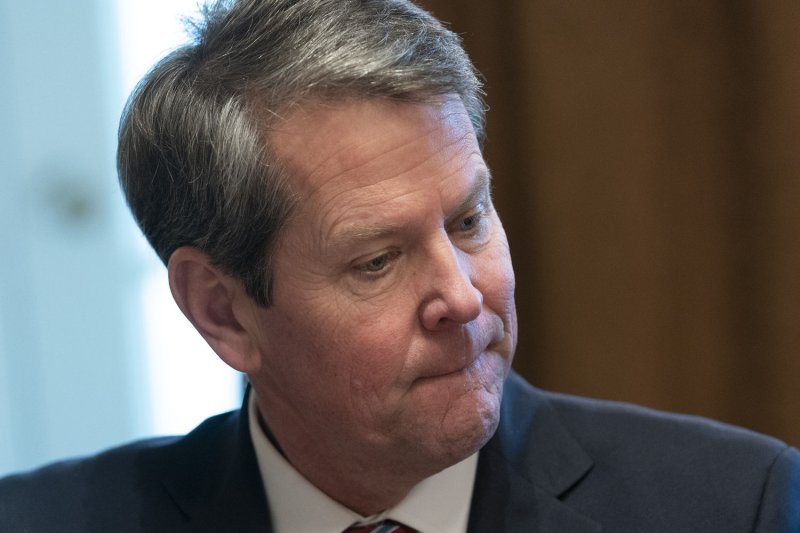Governor-elect Brian Kemp of Georgia participates in a meeting hosted by United States President Donald J. Trump with governors-elect at the White House in Washington, DC on December 13, 2018. Photo by Chris Kleponis/UPI |
License Photo
April 20 (UPI) -- Governors in Georgia, South Carolina and Tennessee announced changes Monday that pave the way for some businesses to reopen between now and May 1 after weeks of pandemic lockdown orders.
Georgia's Republican Gov. Brian Kemp announced changes that will take place as soon as Friday, April 24.
A statewide mandate will allow for the reopening of businesses including fitness centers, tattoo studios, hair and nail salons, barbers, bowling alleys and massage therapy businesses on Friday if they meet social distancing measures, Kemp said.
Church services may resume if they follow the state's safety policies, Kemp said.
Theaters and restaurants will be allowed to open on Monday, April 27, but night clubs and bars will remain closed for now, Kemp said.
The state will not lift the general "shelter in place" order until April 30, and the governor said "medically fragile" people should remain home through May 13.
Georgia health authorities have confirmed about 19,400 positive cases of COVID-19, with 3,700 hospitalized and 775 deaths as of Monday.
In South Carolina, Republican Gov. Henry McMaster lifted an April 3 executive order that certain businesses must be limited to curbside service.
Retail stores can reopen for customers if they operate at 20 percent of fire-code occupancy levels or allow no more than five customers per 1,000 square feet, the new rules mandate.
Clothing, furniture, jewelry, department and sporting goods stores will be allowed to welcome back customers, as well as florists and flea markets, McMaster said.
However, still closed will be hair salons and barber shops, as well as gyms, nightclubs and bingo halls, the governor said.
Some public beaches were reopened in South Carolina this week, under the jurisdiction of local authorities.
"This is a gradual step," McMaster said. "Don't misunderstand - we're not opening up all businesses, as usual, by any means."
South Carolina has identified 4,439 positive cases of COVID-19, with 124 deaths, the state health department said Monday.
Tennessee's Gov. Bill Lee, also a Republican, said Monday that the state's safer-at-home order is set to expire April 30. Some businesses will be able open as soon as Monday, April, 27, Lee said.
"While I am not extending the 'safer at home' order past the end of April, we are working directly with our major metropolitan areas to ensure they are in a position to reopen as soon and safely as possible," Lee said in a statement.
"Social distancing works, and as we open up our economy it will be more important than ever that we keep social distancing as lives and livelihoods depend on it."
About 7,240 positive confirmed cases of COVID-19 were identified by the state of Tennessee health authorities Monday, and 152 deaths.
When asked whether states should be permitted to reopen businesses without having met the criteria laid out in the White House guidelines to reopen the country, including a 14-day period of decreasing cases, Deborah Birx said the decisions will be left to the states.
"We have asked every governor to follow the guidelines just as we've asked every American to follow the guidelines put out by the president but each of the governors can decide for themselves whether they've reached specific guidelines in specific areas," Birx said.
She added that states could make decisions to reopen in certain areas where coronavirus cases are less frequent based on data from their Department of Health websites that list cases, hospitalizations and other information by county and zip code.
"When you inform the public and give them the information that they need, then they can make decisions along with the local government and governors," said Birx.















